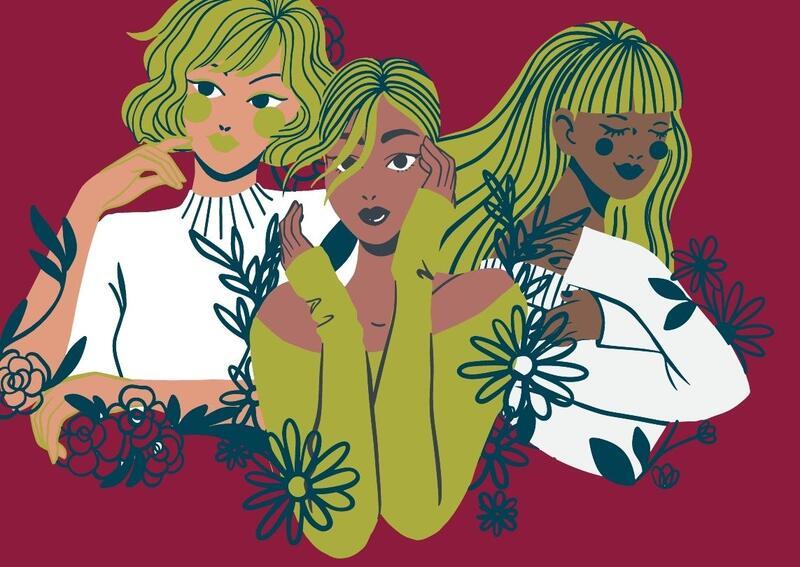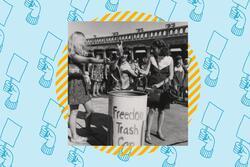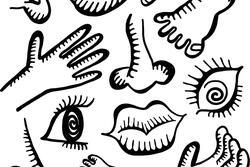My Journey with "Pretty Privilege" and Work Toward Reclaiming My Own Image
Beauty is in the eye of the beholder, but the beholders have been trained to only see beauty in a select few. I fit conventional beauty standards, which means that I benefit from the beauty premium—also known as “pretty privilege.” Pretty privilege is a series of unearned social, political, and economic advantages experienced by a person whose appearance conforms to that of social beauty. These advantages include being more likely to be offered a job and to receive good grades. It's a rarely-discussed topic—likely due to its complexity, the fear of coming off as conceited for implying that you’re pretty enough to benefit from privilege, and the fear of backlash in honestly addressing ways in which society's beauty norms can hurt all people involved.
I’ve experienced pretty privilege since I was young. When people met my sister and me when we were kids, their first comments were always about our looks: our beautiful and ethnically-ambiguous appearances seemed to leave people interested to learn more about us. We both have features and characteristics that are seen as exotic yet do not shy too far from the European views of beauty, courtesy of our Mexican father and white European mother.
As time went on, I began to see the difference in how I was treated when I presented myself in conventionally attractive ways. Toward the end of middle school, when I started dressing in trendy clothes, wearing my hair down, and using makeup, I suddenly became a popular girl—even though all I'd done to change was start closely following societal norms about physical appearance. My experience with beauty also shifted around the same time my body filled in. There was a newfound focus on my chest and physique. At some point during this time, my body took on a whole new meaning. It—I—became a vessel for people and society to look at and make comments about. Sometimes, I felt capable of taking this mass obsession with bodies like mine and using it advantageously; when I conformed to patriarchal norms, I experienced a confidence boost and the exhilarating feeling of playing a role in a movie. At my eighth grade graduation, when I covered my face in makeup, wore tan heels and a white dress which showed off my newfound cleavage, I walked into that school gym and it all felt staged and perfect. I could see the slow-motion shot that the director would capture me in. There was loud music playing in the background that matched the beat of my walk. The camera panned out as I was walking and I slowly turned my head and smiled off-screen. I felt a rush of euphoria as all eyes turned on me.
The moment didn’t last, though. Soon, I felt the stress and repercussions that accompany a constant effort to please the patriarchy: exhaustion, sadness, the futility of trying to reach a platform in the sky. It started to feel like my beauty wasn’t my own; rather, it belonged to a group of old men sitting in a conference room making decisions about how to advertise and sell their image of a perfect young woman. My beauty belonged to the strangers I passed on the streets who made snap judgments about me based on how I looked that day. My time and energy belonged to the image, the idea of what I believed to be perfect, as I obsessed about what to wear and who to be. I began to wonder: what is beauty? Is it how you’re perceived? Is it what’s in the current trend? In ten years, will the image of female perfection change completely, thus continuing its constant unattainability?
The changes that I made in middle school were heavily influenced by American media, and American media’s ideals of beauty are filled with paradoxes. The idea of "effortless beauty," causes people to constantly strive for perfection, yet avoid acknowledgement of the amount of effort and commitment it takes. Society also praises features of people of color—full lips, large eyes, tan skin—yet only allows these features to be beautiful on white and light-skinned people. White people spend hours sunbathing trying to achieve the natural melanin of the same people that they have spent centuries harming. The media fetishizes and reduces different groups to monolithic tropes. I was finding I was no exception to its gaze.
Then came 2020 and along with it, the meteor of the pandemic. Alone in my room, I no longer received any sort of external validation. I was no longer putting in copious amounts of time to make others happy about my looks, and I was forced to refigure my relationship to beauty. I discovered things that made me feel beautiful. These were simple things, like going on a picnic by myself and wearing a cute outfit. Like blasting music in my ears and watching Dirty Dancing two times consecutively. Media is largely modeled after the male gaze; a way of portraying beauty that appeals to what men find attractive. Think Harley Quinn in Suicide Squad (directed by a man) versus Harley Quinn is Birds of Prey (directed by a woman). This large focus on the male gaze precludes focus on the female gaze, and that is synonymous with excluding the female voice and experience. During this time, I changed my idea of beauty from the sterile, immobile Barbie plastic male gaze to the emotionally intimate female gaze.
This journey set the groundwork for my realization of pretty privilege. It’s important to acknowledge one's privilege, and in doing so, individuals must understand when and why they are seen as “beautiful” or “ugly.” Having to grapple with these realities may make us uncomfortable, especially if we’re on the receiving end. After all, we’re conditioned from a young age to always keep beauty in our minds, but not to discuss it out loud. To express to the world our inadequacies, instead of celebrating our bodies. How are we expected to navigate conversations surrounding a topic that is so intangible? A topic that is influenced by many different aspects of our society, including but not limited to race, ethnicity, age, and culture.
The answers to these fundamental questions aren’t so clear. Like tackling any other kind of ingrained societal discrimination, the first step in addressing the “beauty premium” lies in facilitating nonjudgmental conversations with people of varied backgrounds who have experienced it in varied and unique ways. Only through these conversations can we start to change the prejudice that our society has ingrained in the human psyche. Only then can we unlearn the self-hate and the biases we hold against each other.
This piece was written as part of JWA’s Rising Voices Fellowship.







